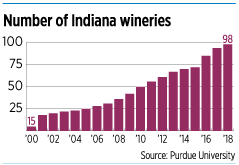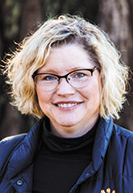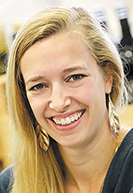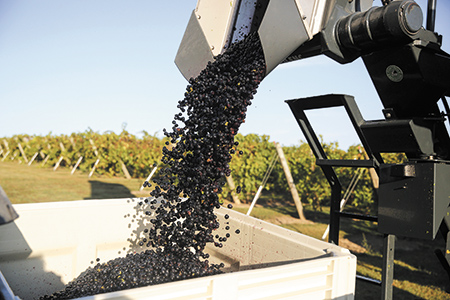Subscriber Benefit
As a subscriber you can listen to articles at work, in the car, or while you work out. Subscribe NowBruce Bordelon, professor of viticulture at Purdue University, is fretting about the weather. The state is getting way too much rain, which plays havoc with maturing grapes. Excess moisture can cause them to burst, and encourages mold and other harvest-damaging ailments.
 Bordelon
Bordelon“It has rained every week since the last week of July,” Bordelon said. “That’s the worst thing that can possibly happen. That’s why so many of the nation’s grapes are grown in California and Washington and Oregon, where they don’t get summer rains during the ripening phase.”
Still, things could be worse. Just a couple of decades ago, Indiana had virtually no wine-grape crop to worry about. Today, the annual harvest (and the 2.4 million gallons of wine it makes) generates an economic impact of $600 million, sustains 4,000 full-time jobs, and pays $37 million in state and local taxes and $38 million in federal taxes.
Much of the credit for the rise of Indiana’s wine industry belongs to a tiny Purdue University program that goes by the unlikely name of the Purdue Wine Grape Team. Over the last two decades, this four-person cadre of experts has been instrumental both in husbanding the local winemaking industry and in raising its profile nationwide.
“Tens of thousands of people have taken our classes and attended the
 Butzke
Butzkeevents we coordinated,” said Christian Butzke, professor of enology (winemaking) and a member of the Purdue Wine Grape Team. “That’s how we reach a lot farther than just teaching at Purdue.”
Indiana had a thriving (though somewhat rustic) wine industry during the 18th and 19th centuries, but Prohibition killed it on the vine. A revival began in 1971 when the Indiana General Assembly, nudged by Indiana University law professor (and winemaking hobbyist) William Oliver, passed the Indiana Small Winery Act that allowed for the creation of small Indiana winemakers. A year later, Oliver opened Oliver Winery, which has grown to become Indiana’s largest.
Initially, however, only a handful of operations set up shop. The Indiana Wine Grape Council was established by the Indiana General Assembly in 1989 to goose growth by disseminating winemaking research and providing marketing help. It’s funded by a portion of the 5-cent excise tax on every gallon of wine sold in Indiana—a fund that also pays the salaries of the Purdue Wine Grape Team. The tax generates about $550,000 a year.
Founded in 1991, the team is an agricultural extension program composed of enology, viticulture and marketing specialists who assist Indiana winemakers and grape growers. Team members (who include, along with Butzke and Bordelon, Katie Barnett and Jill Blume) come from Purdue’s departments of Food Science and Horticulture & Landscape Architecture.
“Purdue is renowned,” said Michel Pascal, co-owner of Carroll Wine & Spirits, a Fishers-based fine-wine and spirits distributor. The state has nearly 100 wineries, he said, “and all of them use Purdue as a research tool. And when I travel to California and talk about Purdue, people know exactly what’s going on. They know what it is.”
 Small program, big impact
Small program, big impact
That’s quite a compliment for a program that’s not a school or department and doesn’t even offer so much as an undergraduate minor. Though Butzke has for years taught a popular wine-appreciation class that draws 250-plus students for each session, the team’s extension efforts—encompassing everything from soil analysis to fact-finding tours of vineyards around the world—is the chief reason Indiana now contains 98 wineries, compared with about 10 in 1991.
“I think the fact that Purdue had a program, and we were able to help them, is what helped give them the confidence to do it,” Bordelon said.
“Many operations around the state went ahead with five-acre, 10-acre plantings. That probably wouldn’t have happened if we hadn’t been here to offer workshops, to do things to show what they could grow and how to grow it, and to put together publications to show how to manage crop loads. We provided the support they needed to gain the confidence to grow the industry.”
One of Purdue Wine Grape Team’s biggest success stories is Oliver. When it opened in 1972, Oliver sold a respectable 2,000 cases of wine. Now it sells about 430,000 cases annually, in 26 states.
But CEO Bill Oliver, son of founder William Oliver, said there was a time back in the 1990s when Oliver almost gave up on growing its own grapes. The Indiana weather was just too changeable. Bordelon pitched in to turn things around, Oliver said.
“He was tremendously helpful in helping us solve problems,” he said. “And Lord knows you’ve got a lot of problems growing grapes in Indiana. We have 60 acres now, but I don’t know if we’d have even one if it weren’t for Purdue.”
Broader recognition
The program also reaches beyond the state’s borders. It’s swollen the ranks of Indiana-born winemakers and vineyard owners worldwide, with Purdue Wine Grape Team disciples ranging as far afield as Napa Valley and New Zealand.
“Purdue’s enology and viticulture program is nationally recognized,” said Dan Howard, executive director of the American Society for Enology and Viticulture.
People touched by the grape team’s programs form part of a worldwide diaspora of Hoosiers who’ve made it big in the wine industry.
For instance, one of Butzke’s graduate assistants, Patty Skinkis, received a doctorate in viticulture at Purdue and is now an associate professor and viticulture extension specialist for the highly regarded wine program at Oregon State University.
 Apolloni
ApolloniKokomo native (and Purdue grad) Erik Miller owns the well-regarded Kokomo Winery in Dry Creek Valley, California; Purdue graduate Mike Sweeney owns Oregon’s Cherry Hill Winery; and another Purdue alum, Laurine Leep Apolloni, owns Apolloni Vineyards in Oregon.
Apolloni majored in mechanical engineering at Purdue and didn’t get fully into wine until after she graduated, but that’s not an uncommon career path in the vineyard biz.
“What you find in the wine industry is a lot of former engineers and scientists who have a passion for wine, and who transfer their problem-solving and technical skills to the areas of viticulture and enology,” she said.
Butzke makes a point of keeping in touch with such Purdue grads, whether they were part of the school’s wine programs or not.
He invites them to speak at his wine appreciation class, and to serve as judges at the annual Indy International Wine Competition, the 27th edition of which was completed in June, and for which he’s chief judge. The world-renowned gathering brings in competitors from all over the world.
A cozy industry
Purdue cuts a high profile because it’s a fairly big fish in a small pond. When it comes to agricultural enterprises, the entire wine industry pales in comparison to crops such as corn, wheat or even tomatoes.
As Butzke points out, only about 20 million acres worldwide are planted in grapes—a mere fraction of the 350 million acres of cropland in America alone. And Indiana has only about 600 acres of grapes, which barely amounts to a rounding error when compared to its 16 million acres of prime agricultural land.
“We often say in the wine industry that there’s hardly ever more than one or two degrees of separation between anybody anywhere in the industry,” Butzke said. “It’s an international community, but it’s also a local one.”
But still, that small parcel is responsible for thousands of jobs that didn’t exist 20 years ago.
The university has facilitated that growth, helping people who want to start a winery, providing continuing education to those already in the industry, and helping train future winery employees.
 Zwink
ZwinkAnne Zwink, a Purdue graduate who spent a great deal of time under Butzke’s tutelage (and who went on to earn a master’s degree in food science with a focus on enology from Washington State University), couldn’t agree more.
She’s now the winemaker at Soldier Creek Winery in Iowa, which—like Indiana—is in the midst of a prolonged effort to stoke its grape industry.
“Every state has a handful of wineries, but that number is growing year after year,” Zwink said. “It’s definitely an industry that’s up and coming.”
Even after this year’s truly awful grape-growing weather, Bill Oliver is upbeat. He noted that the previous three years were fine.
“You’ve got to take the good with the bad in agriculture,” he said.
As for the future of Indiana’s wine industry, he thinks there’s plenty of room for even more growth—a view he didn’t always hold.
“It you’d have asked me eight or 10 years ago, I’d have said it’s as big as it’s ever going to get,” Oliver said. “But now it’s probably three times larger than it was then.”•
Please enable JavaScript to view this content.

